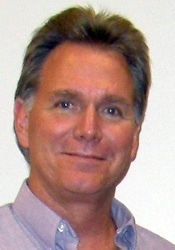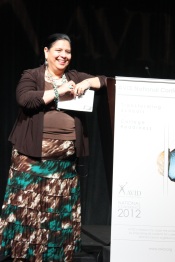Consuelo Castillo Kickbusch: A Remarkable Journey
 AVID Center
AVID Center  Friday, April 12, 2013 at 8:15AM
Friday, April 12, 2013 at 8:15AM By Rob Gira, Executive Vice President, AVID Center

The following is a condensed version of a story from AVID’s upcoming spring Access.
When I heard Consuelo Castillo Kickbusch speak at our National Conference in December of 2012, I was determined to learn more about this remarkable leader, author, and child advocate. What an intriguing story: One of 10 children raised in the barrio in Laredo, Texas (an area then known as the Devil’s Corner), she made her way through the hazards of poverty, drugs, and violence, on to college, and then became the highest-ranking Hispanic female officer in the Combat Support Field of the U.S. Army. Today, as a motivational speaker and consultant, she is equally comfortable working with families in migrant camps, speaking with schools and districts, or inspiring the leaders of corporations.
Consuelo entered school speaking little or no English, but through the high expectations and support from her parents, neither of whom had more than a grade school education, she and her brothers and sisters achieved great success. Eight of the children are veterans, and Consuelo herself retired as a Lieutenant Colonel. After hearing her speech, I read her book Journey to the Future, which is intended for adolescents and details some of the challenges that she faced, including racism, sexual abuse, and the low expectations of some teachers who saw her as one of “those kids.” Spiritual, motherly, and hilarious, Kickbusch did not meet my stereotype of the military officer, but now she commands in perhaps a more powerful way.
In your books and in your presentations, you refer a great deal to the influence of your mother and father, describing them as your first teachers. What were some of the great lessons you learned from them?
I learned that there are two types of education that every young person should acquire. My parents felt that is was their responsibility to educate me and that it was the school system’s responsibility to prepare me. There were certain character traits they wanted me to have, and they encouraged these by telling me stories. My parents were very committed to a set of values, which I include in my book. They believed in integrity, humility, and pride. Humility and pride worked together in my parents’ eyes. Lots of people struggle with that. My father believed that you can do a job well and that will attract people and praise, but that humility comes first.
You rose through the ranks of the military, a much-decorated leader. Yet, it was a pivotal moment with your mother that gave you a different vision for leadership and set you on the path you now travel. What happened?
After I left Laredo, my mother remained in the barrio. In thinking back on the environment there, I know it was challenging in my youth, with drugs and violence, but the later years there for my mother saw a change. The violence had escalated to the point where she was afraid to even cross the street. The random violence from gangs troubled her greatly. She felt that we were losing the whole fabric of our society. People were afraid to even sit on their porches. She asked herself, “What can I do? Perhaps I can encourage my own successful child to lend a hand.” She knew I had accomplished a great deal. She came to visit me when I was about to receive my Master’s degree. She said to me, “I am dying.” I laughed and said, “You die every Thursday.” And she replied, “No, this time I am, and I have a last wish.” It was clear she had thought about it. So, we took a walk as we always did when we had something to consider. And as always, she made me take off my shoes. I now had middle-class feet, and I asked why we were doing this. She said, “I want your feet on the ground for this. They say you are a leader? But are you the most extraordinary kind?” I asked her what she meant. “Extraordinary leaders pass on all they learned. Watching your father and me, didn’t you see us share with others, how your father attended to troubled families? Did you not observe that we are all tied together?” Keep in mind that my father had no formal education, and my mother made it through third grade.
I had no answer for my mother. I was so consumed with my current leadership path. She then reminded me that when we serve others, we live a complete life, a life with no regrets. She asked me to stop what I was doing, end my career, and find a way to serve. I told her I didn’t think I could do it. Why? I think we just go after things with such focus—the next rank, the next house, the next car, running a race of acquisition.
My mother put a stop sign in front of me, but I ignored it. I didn’t think I had what it took. When she died two weeks later, I realized I needed to change my life. When I began to work with gang members, I saw them as more than just dangerous kids; I saw all of them, the whole child. All of this was because of my mother. She would be proud.
In your speech at our National Conference, you described some educators as “angels on earth.” You also had some terrible experiences with educators growing up. Who were your angels and how did they help you? How did you overcome the bad educational experiences?
I often ask educators what they perceive their work to be. Some say, “I had no idea I would have to be a mother, a psychologist, a nurse, all these roles,” and they are bitter. Others say, “I am blessed that students get so much from me.” With over 50,000 educators I’ve talked to, there seems to be no middle ground. They either resent the situation and want to retire, or they see that their role is to give and spend time with their students. I call them “angels on earth” because they are making the same pay as the bitter ones. I equate it to their passion and devotion.
I am always in awe and so pleasantly surprised to hear them with such passion in equating everything they do for their students. I know one teacher who gives students rides to classes, takes them to concerts, and creates special events for them. That’s what I love about AVID. The first thing I notice about AVID educators is their attitude. They embrace the belief that they are there to serve. I wish every child could be exposed to AVID. I have been in many AVID schools and the common attitude is: no excuses. “We go the extra mile. We will not allow failure.”

In your book, Journey to the Future, you have a chapter on identity, in which you encourage young people to speak up. Why is this so important, and what do you say to educators about listening to student voices?
Every single soul has a story. Young people are often regarded as not ready, lacking wisdom, just there to receive instruction. Actually, young people are extremely insightful, and they struggle to be heard. They often feel invisible, unimportant, dismissed. As humans, we always struggle with who we are. If we can encourage young people to have a view of themselves, an identity, this benefits all of us.
Sometimes, I see teachers who are very content-driven, low on relationships with their students. This is very sad to me.
Read the rest of Rob’s interview with Kickbusch in our upcoming issue of Access!
Reader Comments (3)
Inspiring!! Thank you for sharing this.
Teri
This story is a remarkable journey. I too believe students struggle to be heard and AVID teachers struggle to be heard.
Thanks, Rob, Consuelo spiritually introduces the new Blended Learning launch: "AVID and Brain Science" - she gave permission to add the word "love" to our AVID glossary!